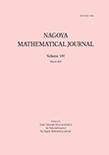
NAGOYA MATHEMATICAL JOURNAL
Scope & Guideline
Fostering Vibrant Dialogue in the World of Mathematics
Introduction
Aims and Scopes
- Algebraic Structures:
The journal frequently addresses topics related to algebra, including ring theory, module theory, and homological algebra, reflecting a strong interest in the structure and properties of algebraic entities. - Geometry and Topology:
Many papers explore geometric concepts, particularly in birational geometry, algebraic geometry, and differential geometry, indicating a commitment to understanding the intricacies of shapes, spaces, and their properties. - Mathematical Analysis:
The journal includes research on various analysis branches, such as functional analysis and complex analysis, showcasing methodologies that often involve rigorous proofs and theoretical frameworks. - Representation Theory:
A significant portion of the articles delve into representation theory, particularly in relation to algebraic groups and Lie algebras, which emphasizes the interplay between algebra and geometry. - Number Theory:
There is a consistent focus on number theory, particularly in relation to algebraic structures and arithmetic properties, highlighting the journal's commitment to foundational mathematical concepts. - Categorical and Homotopical Methods:
The journal embraces categorical and homotopical perspectives, emphasizing the use of category theory in understanding mathematical structures and relationships, which is indicative of modern mathematical approaches.
Trending and Emerging
- Perfectoid Spaces and Related Structures:
There is a growing interest in perfectoid spaces and their applications, indicating a trend towards exploring new geometric frameworks that unify various areas of mathematics. - Noncommutative Geometry:
Research in noncommutative geometry is on the rise, reflecting an increasing fascination with the connections between geometry and algebra, particularly in the context of quantum physics and advanced algebraic structures. - Arithmetic Geometry:
Recent publications showcase a heightened focus on arithmetic geometry, particularly concerning moduli spaces and their applications in number theory, which signifies an expanding intersection between these fields. - Higher Dimensional Algebra:
The journal is seeing more papers on higher-dimensional algebraic concepts, indicating a trend towards abstract algebraic structures that extend traditional theories into higher dimensions. - Mathematical Physics Interactions:
There is an emerging trend of interdisciplinary research that connects mathematics with physics, particularly through the study of mathematical structures that underpin physical theories.
Declining or Waning
- Classical Topology:
There has been a noticeable decrease in papers focusing on classical topology, suggesting that researchers are increasingly exploring more abstract or applied aspects of topology rather than traditional topics. - Elementary Number Theory:
Papers dedicated to elementary number theory appear to be less common, indicating a shift towards more complex and abstract number theory, often intertwined with algebraic structures. - Combinatorial Geometry:
The frequency of works addressing combinatorial geometry has diminished, possibly due to a shift in focus towards more algebraic or geometric properties rather than purely combinatorial aspects. - Linear Algebra Applications:
Research discussing applications of linear algebra in various contexts seems to be waning, suggesting a move towards more theoretical explorations or interdisciplinary applications. - Classical Analysis Techniques:
The application of classical analysis techniques in research appears to be decreasing, possibly replaced by more modern analytical methods or computational approaches.
Similar Journals

Pure and Applied Mathematics Quarterly
Fostering Innovation in Mathematical DisciplinesPure and Applied Mathematics Quarterly is a prestigious journal published by INT PRESS BOSTON, INC, focusing on the diverse and evolving field of mathematics. Since its inception in 2007, this journal has grown significantly, currently holding a Q1 ranking in the Mathematics (Miscellaneous) category for 2023, positioning it among the leading publications in the discipline. With a commitment to publishing high-quality research, Pure and Applied Mathematics Quarterly fosters innovation and dialogue within the mathematical community by providing a platform for theoretical advancements and practical applications. The journal remains accessible to researchers and professionals through its ISSN 1558-8599 and E-ISSN 1558-8602, although it does not currently offer open access. As a vital resource for mathematicians, educators, and students, this journal endeavors to expand the frontiers of mathematical knowledge and contribute to the academic dialogue surrounding this fundamental science.
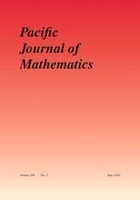
PACIFIC JOURNAL OF MATHEMATICS
Advancing Mathematical Inquiry Since 1951The PACIFIC JOURNAL OF MATHEMATICS, established in 1951 and published by Mathematical Sciences Publishers, is a premier peer-reviewed journal in the field of mathematics, renowned for its rigorous scholarship and impactful research contributions. With an HIndex that reflects its sustained academic influence, this journal has been categorized within the Q1 quartile in the field of mathematics (miscellaneous) as of 2023, showcasing its position among the top-tier mathematics journals globally. Although the journal operates under a traditional subscription model rather than an Open Access format, it remains dedicated to disseminating original research that spans various domains within mathematics. Researchers, professionals, and students alike will find the journal's breadth of topics and commitment to quality work instrumental in advancing their understanding and exploration of mathematical concepts. This esteemed journal continues to thrive as a vital resource for the mathematical community through its comprehensive collection of articles from a diverse range of mathematical disciplines, thus maintaining a significant role in shaping the future of mathematical inquiry.
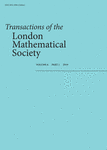
Transactions of the London Mathematical Society
Unlocking Innovations in Mathematics, Open to AllTransactions of the London Mathematical Society is a prestigious journal published by WILEY, dedicated to advancing the field of mathematics across various sub-disciplines. With its commitment to Open Access since 2014, the journal ensures that research findings are widely disseminated and accessible to a global audience, enhancing collaboration and innovation in the mathematical community. Based in the United States, this journal enjoys a prominent position within the academic landscape, evidenced by its Q1 ranking in the 2023 Mathematics (miscellaneous) category and its ranking of 181 out of 399 in the General Mathematics category on Scopus, placing it at the 54th percentile. The journal publishes high-quality, peer-reviewed research articles and surveys that aim to foster advanced study and discussion in mathematical sciences, making it an invaluable resource for researchers, professionals, and students alike. With a focus on original research and significant contributions, the Transactions of the London Mathematical Society continues to play a crucial role in the evolution of mathematical inquiry.

TRANSACTIONS OF THE AMERICAN MATHEMATICAL SOCIETY
Advancing Mathematical Frontiers Since 1900TRANSACTIONS OF THE AMERICAN MATHEMATICAL SOCIETY, published by the American Mathematical Society, is a premier journal in the field of mathematics that has been contributing to the advancement of mathematical knowledge since 1900. With an ISSN of 0002-9947 and an E-ISSN of 1088-6850, this journal holds a prestigious position in the academic landscape, evidenced by its Q1 rankings in both Applied Mathematics and Miscellaneous Mathematics categories as of 2023. With a Scopus ranking of #97 in General Mathematics and a percentile standing of 75th, the journal is recognized for its rigorous peer-review process and the quality of the research it publishes. Though it does not currently offer open access options, it essentially serves as a vital resource for researchers, professionals, and students seeking critical insights and developments in mathematical theory and applications. The Transactions aim to publish high-quality research articles that foster the exchange and dissemination of ideas, supporting the growth of both theoretical and applied mathematics within the global scholarly community.
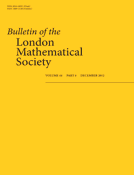
BULLETIN OF THE LONDON MATHEMATICAL SOCIETY
Advancing Mathematical Frontiers Since 1969The BULLETIN OF THE LONDON MATHEMATICAL SOCIETY, published by Wiley, is a distinguished journal that serves as a vital resource in the field of mathematics. With its ISSN 0024-6093 and E-ISSN 1469-2120, this journal has consistently provided a platform for innovative research and scholarly discourse since its inception in 1969. Recognized for its quality, it currently holds an impressive Q1 ranking in the mathematics category, a testament to its significance in disseminating influential findings and trends in the mathematical sciences. Researchers and practitioners can rely on the BULLETIN for its comprehensive coverage of both theoretical and applied mathematics, which caters to a diverse audience ranging from professionals to students alike. Though it does not currently offer Open Access options, its articles can be accessed through institutional subscriptions, ensuring that significant works reach the academic community effectively. With contributions that span over five decades, the journal continues to shape mathematical research and inspire future advancements in the discipline.

Bulletin Mathematique de la Societe des Sciences Mathematiques de Roumanie
Pioneering Insights in the World of MathematicsThe Bulletin Mathematique de la Societe des Sciences Mathematiques de Roumanie, published by SOC MATEMATICE ROMANIA, is a distinguished platform dedicated to the dissemination of advanced mathematical research and developments. With ISSN 1220-3874 and E-ISSN 2065-0264, this journal serves the global mathematical community, particularly in Romania, fostering collaboration and innovation in varied mathematical disciplines. Despite being categorized in the Q3 quartile of the *Mathematics (miscellaneous)* field and holding a Scopus rank placing it in the 19th percentile, the journal remains committed to publishing high-quality articles that explore theoretical and applied mathematics. Running from 2008 to 2024, it aims to encourage the sharing of knowledge and advancements within both academic and practical domains, affirming its importance as a valuable resource for researchers, professionals, and students alike. Although the journal does not currently offer open access, it contributes to the mathematical discourse through the rigorous selection of papers that adhere to high scholarly standards.

Selecta Mathematica-New Series
Elevating Mathematical and Physical Sciences.Selecta Mathematica-New Series is a premier academic journal published by Springer International Publishing AG, based in Switzerland. With an impressive impact in the fields of Mathematics and Physics, it is recognized in the Q1 category for both Mathematics (Miscellaneous) and Physics and Astronomy (Miscellaneous) as of 2023. Established in 1995, the journal provides a platform for rigorous peer-reviewed research, facilitating the dissemination of groundbreaking findings and theoretical advancements through its converged publication years up to 2024. Researchers and scholars seeking to stay at the forefront of mathematical and physical sciences will benefit from the journal's diverse scope and high-impact articles. Although it does not operate under an open-access model, Selecta Mathematica-New Series remains a vital resource for building knowledge and fostering collaboration among professionals and students engaged in these dynamic fields. Access to its content is essential for those aiming to deepen their understanding and contribute to the ongoing dialogue within the scientific community.
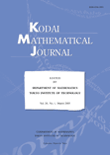
Kodai Mathematical Journal
Empowering Researchers with Rigorous Mathematical DiscourseKodai Mathematical Journal is a distinguished publication dedicated to advancing the field of mathematics, particularly in miscellaneous areas. Established in 1949, this esteemed journal has been a reputable source for researchers and practitioners who seek to contribute to the rich landscape of mathematical knowledge. Published by KINOKUNIYA CO LTD, the journal is based in the academic environment of Tokyo Institute of Technology and serves a global audience with rigorous and insightful research articles. Despite its current Q3 quartile ranking in the Scopus Mathematics category, which reflects its niche but impactful contributions, the journal is poised for growth; the convergence of traditional and novel mathematical techniques promises to enhance its relevance further. Researchers, professionals, and students are encouraged to engage with the rich content of the journal, aimed at fostering collaboration and nurturing innovation in the mathematical community. While currently not available as Open Access, Kodai Mathematical Journal remains a critical resource for those passionate about mathematics and its applications.
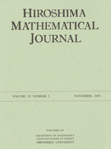
Hiroshima Mathematical Journal
Connecting Researchers Through Innovative Mathematical InsightsThe Hiroshima Mathematical Journal, published by Hiroshima University, Graduate School of Science, serves as a prominent platform for disseminating high-quality research in the field of mathematics. Established in 1959, the journal has been an integral part of the mathematical community, focusing on areas such as Algebra, Number Theory, Analysis, and Geometry and Topology. Although currently classified in Q4 quartile rankings within its categories, the journal is committed to advancing mathematical knowledge and fostering scholarly dialogue. Its accessibility, combined with its long-standing history, makes it an essential resource for researchers, professionals, and students dedicated to exploring and enhancing the mathematical sciences. For those interested in contributing or accessing cutting-edge research, the Hiroshima Mathematical Journal continues to uphold its mission of excellence in mathematical scholarship.

JOURNAL OF THE KOREAN MATHEMATICAL SOCIETY
Fostering innovation in mathematics, one article at a time.JOURNAL OF THE KOREAN MATHEMATICAL SOCIETY is a premier academic publication dedicated to advancing the field of mathematics through rigorous research and scholarly discourse. Published by the esteemed Korean Mathematical Society, this journal provides a platform for mathematicians and researchers to disseminate their findings, engage in innovative ideas, and connect with the global mathematical community. With an ISSN of 0304-9914 and E-ISSN 2234-3008, the journal has established itself as an important resource in the mathematical landscape, currently holding a Q3 classification in the ‘Mathematics (miscellaneous)’ category as per the 2023 rankings. Though not open access, the journal is committed to promoting high-quality contributions that span various mathematical disciplines, making it indispensable for students, researchers, and professionals alike. Operating from its base in Seoul, South Korea, it contributes to the international mathematics community by publishing cutting-edge research from 1997 to 2024 and beyond, facilitating an avenue for knowledge sharing and innovation in mathematics.